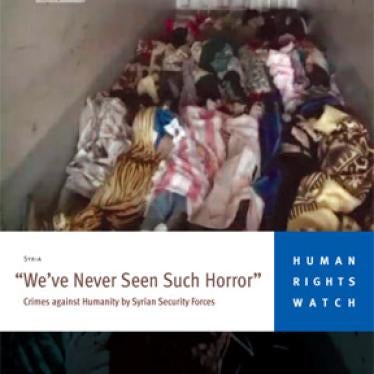(Cairo) – The League of Arab States should demand that Syria’s government allow independent, on-the-ground, civilian monitors to observe the behavior of the security services, Human Rights Watch said today. Such monitoring would be an essential step to end the violence in Syria and restore a climate of trust, Human Rights Watch said.
An Arab ministerial committee is expected to arrive in Damascus on October 26, 2011, to discuss the possibility of a national dialogue between Syria’s government and the opposition. The Arab League should press the Syrian government to immediately stop the violence against peaceful protesters and release all political prisoners, Human Rights Watch said.
“If the Arab League’s initiative is going to have any chance of success, it needs to guarantee that civilians will be protected,” said Sarah Leah Whitson, Middle East director at Human Rights Watch. “The only way to make sure civilians are protected is to have on-the-ground monitors whose presence would inhibit abuse by the security services.”
The visit follows an October 16 meeting of the Arab League, at which the League gave Syria 15 days to start a dialogue with the opposition at the League’s headquarters in Cairo. The Syrian government agreed to meet the Arab League delegation but has expressed reservations regarding the initiative. At least 186 protesters and residents have been killed in Syria since the Arab League’s October 16 meeting, according to Syrian human rights activists.
According to the United Nations, Syrian security forces have killed more than 3,000 people, including at least 187 children, since March while arbitrarily arresting and torturing thousands more. Human Rights Watch has documented systematic, widespread, and gross violations of human rights by the Syrian government, amounting to crimes against humanity.
An independent monitoring presence could help clarify the situation on the ground, ensure rapid responses to violations reports, and provide reliable reporting concerning ongoing violations, as well as addressing such issues as the extent of use of force by protesters, Human Rights Watch said. In addition, a monitoring presence in hotspots within Syria could lead the security forces to use greater restraint, and thereby reduce the level of violations.
Human Rights Watch also urged the Arab League delegation to press for the release of all political prisoners and to push the Syrian government to account for all those who disappeared or remain in incommunicado detention.
The Arab League committee is headed by Qatar and is made up of the foreign ministers of Egypt, Oman, Algeria, and Sudan, in addition to Nabil al-Araby, the league’s secretary general.
Russia, a close ally of Syria, expressed support for the League’s Initiative on October 18, and on October 25 China said it would also send an envoy to Syria.
Human Rights Watch urged the Arab ministerial committee to send a clear message to President Bashar al-Assad that Syria’s membership in the Arab League will be suspended if the security forces do not immediately stop committing grave human rights violations.
“How can there be a dialogue with the opposition when most of the activists are either in jail or in exile,” Whitson said. “Without guaranteeing the safety of protesters and activists in Syria, these calls for dialogue will remain excuses for the international community to procrastinate while Syrians get killed.”







